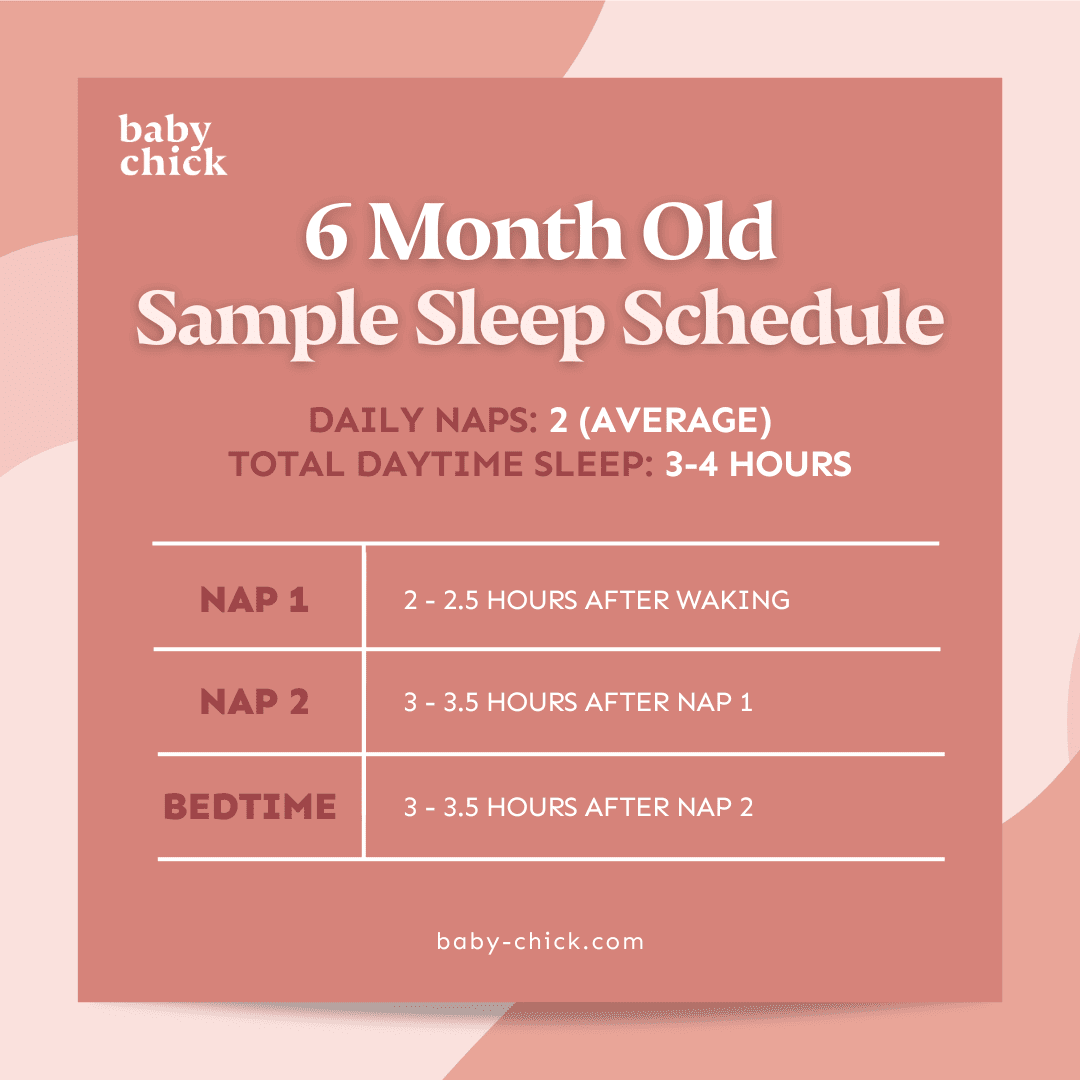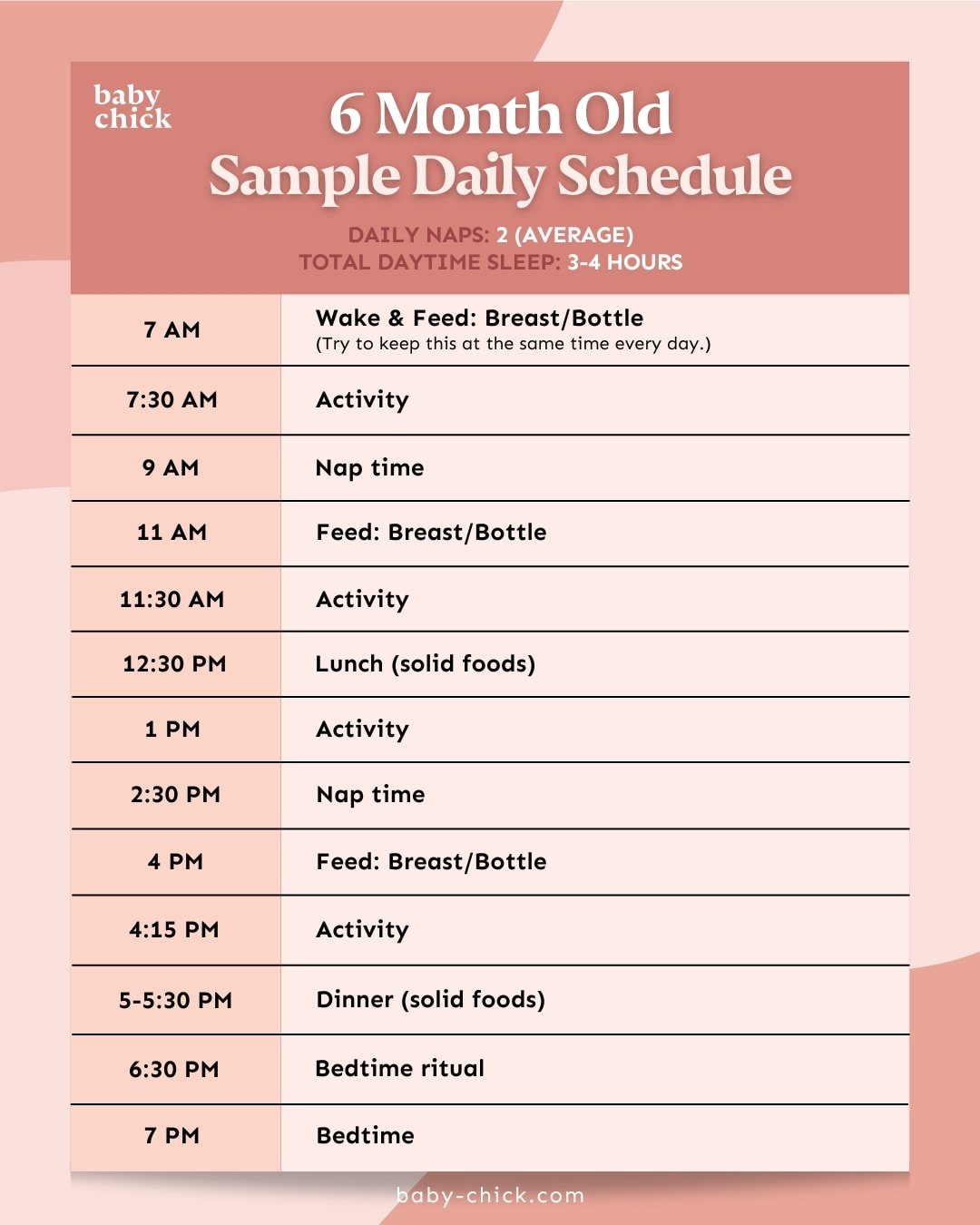6-Month-Old Baby: Feeding, Sleep, and Milestones by Month

I congratulate you; your baby has reached 6 months old! These first six months have been filled with tremendous growth for both of you. Their world has expanded, and there are many more exciting developments and milestones for your 6-month-old. This article will guide you through these new 6-month milestones and give you an outline for their changing feeding and sleep needs and what to expect at their doctor’s visit.
As your baby approaches 6 months of age, his curiosity for the world around him will explode. They will begin to achieve new development milestones every day and at lightning speed. Some of these new milestones to watch your 6-month-old reach include:1,2
- Recognizing and responding to familiar faces
- Looking and interacting with oneself in the mirror
- Laughing and squealing
- Sticking out their tongue and blowing (aka “blowing raspberries”)
- Taking toys they like and putting them in their mouths
- Roll from stomach to back
- Push up with straight arms while on stomach
- Supporting oneself while sitting by leaning on their hands
- Back and forth on their hands and knees
While your baby can sit with support and use their hands to support themselves while sitting, they still can’t sit completely unsupported. Many babies won’t sit up unaided until they’re about 9 months old, when they can easily sit up.13
With their baby at 6 months old, many parents will wonder what new foods their baby can eat. Now is the perfect time to slowly introduce solid foods into your baby’s diet. To safely introduce solid foods, you need to make sure your baby has reached the following 6-month milestones:3
- They can sit up on their own with support
- They can control and support their head and neck
- They open their mouths when offered food
- They can swallow food without pushing it with their tongue
- They can pick up objects and carry them in their mouths
Please consult your doctor if you have questions about whether your baby is ready to eat solid foods.
When your baby is ready to try solid foods, many parents want to know what foods they should start. The general recommendation is to start with a single-ingredient food that is pureed, pureed, or strained. If you give your baby baby cereal, you should give a variety such as rice, oats, barley, or multigrain to avoid overconsumption of certain vitamins or minerals.
You should also introduce one new food at a time and wait three to five days before introducing another. This will help you monitor your baby’s tolerance to new foods.3
Even if your baby starts eating some solid foods, it’s important to remember that most of your baby’s daily nutrition will still come from breast milk or formula. The average 6-month-old will still take 3-5 ounces of milk every two to four hours, between 24 and 32 ounces daily.15
At 6 months old, your baby’s sleep schedule will look very similar, if not identical, to their sleep schedule at 5 months. Six-month-old babies need 12-16 hours of sleep every day, with an average of two daytime naps averaging three to four hours. Many 6-month-olds will sleep nine straight hours or longer at night before waking to eat.5

Many parents may find it more difficult to get their 6-month-old to sleep on a consistent sleep schedule during this time. Many babies may have trouble falling asleep when they are actively playing. One of the best ways to help your child sleep for nap time is to turn your bedtime routine into a mini-nap time sleep routine. If you usually read two books in a dark room before bed, read one in the same setting.
The key is to keep the nap time routine short and calm and put your baby to sleep while they are sleepy. This will help make nap time more successful and ensure your baby gets the sleep he needs.6
Getting out of the newborn phase is a big win when setting up a daily routine at the 6 month milestone marker. Your 6-month-old’s feeding and wake window times will be more consistent, allowing for more playtime, outings, and activities. Implementing a consistent bedtime will help your baby have structure in their day while ensuring your child is getting enough sleep.
It is recommended that a 6-month-old baby take at least two naps per day and sleep a total of three to four hours.5 Their first nap usually occurs within two hours of waking up during the day and lasts about one and a half to two hours. The second nap should occur within two hours of waking from their morning nap and last one and a half to two hours.5,6
Their evening may consist of more playtime followed by trying some more solid foods. Try aiming for a bedtime of 7-8 pm, so starting that routine around 6:30-7 pm will give your child plenty of time to catch his breath for the night.6

Now that your baby has reached his 6 month milestone, he will need another well-child visit. During this visit, your doctor will check your baby’s weight, discuss concerns you may have about their development and diet, and administer vaccines. During this visit, you can discuss with your doctor if your baby has reacted to new foods, such as vomiting, diarrhea, or a rash.7 Your doctor can advise you on the appropriate course of action to determine if your child has any food allergies.
At 6 months of age, your baby will be ready for another round of vaccines. These vaccines include:8
- DTaP (diphtheria, tetanus, and pertussis)
- HiB (Haemophilus influenzae)
- PCV (Pneumococcal)
- Rotavirus
- Influenza and COVID
- Hepatitis B
As your baby grows, they will continue to be exposed to many common diseases. Some of the most common diseases seen at this age include:9
Although many babies can overcome these illnesses with minimal medical intervention, it is important to seek medical attention if your baby experiences any of the following symptoms:9
- Fever that lasts more than three days
- Earache, discharge from the ear
- Signs of dehydration such as dry/cracked lips, decreased number of wet diapers, decreased tears
- Difficulty in breathing
- Increased anxiety
- Energy is reduced

As your baby approaches 6 months of age, he will show signs that crawling may be on the way, such as rocking back and forth while on his knees.2 While your baby probably isn’t ready to crawl yet, you may be wondering how to help them prepare to crawl. Tummy time is the most important activity your baby can do to help with 6 month developmental milestones.10 Placing toys out of reach will encourage your baby to pick them up.2
Some other fun activities you can do with your baby to help their growth and development include:1
- Singing and playing music with them
- The time of use is limited, as it is not recommended for children under 2 years of age to have a duration of use
- Encourage supported sitting, such as sitting on your lap
- Hold your baby under their arms and let them stand
- Whisper, clap, or make funny sounds with your baby
- Allowing your baby to drop their toy and you picking it up will help them learn cause and effect
Your little one is getting a lot of movement and shaking, so now is a perfect time to baby-proof your house. It’s important to keep your baby’s environment safe, and this includes:11
- Using a properly installed rear-facing car seat
- Using baby gates at the top and bottom of the stairs
- Removes all the little things from their reach
- Never leave them unattended or with younger children or pets
- Check out our checklist for baby proofing
If you’re still sharing with your baby, when is it time to move them into their own room? Since the AAP recommends sharing a room for at least the first six months, the 6-month milestone mark may be the perfect time.14 If you’re worried about transitioning, it’s okay to start small, like letting your baby sleep in their own room for one nap a day. Try to have them sleep in their room for both naps during the day. Slowly but surely, your child will get used to sleeping in their room at bedtime and at night.12
The past 6 months have been a wonderful journey filled with growth, exploration, and joy. Your baby is quickly developing the skills to create a bright and happy future. Embrace every moment and celebrate every success your child achieves.! These are important and exciting times with your child!





